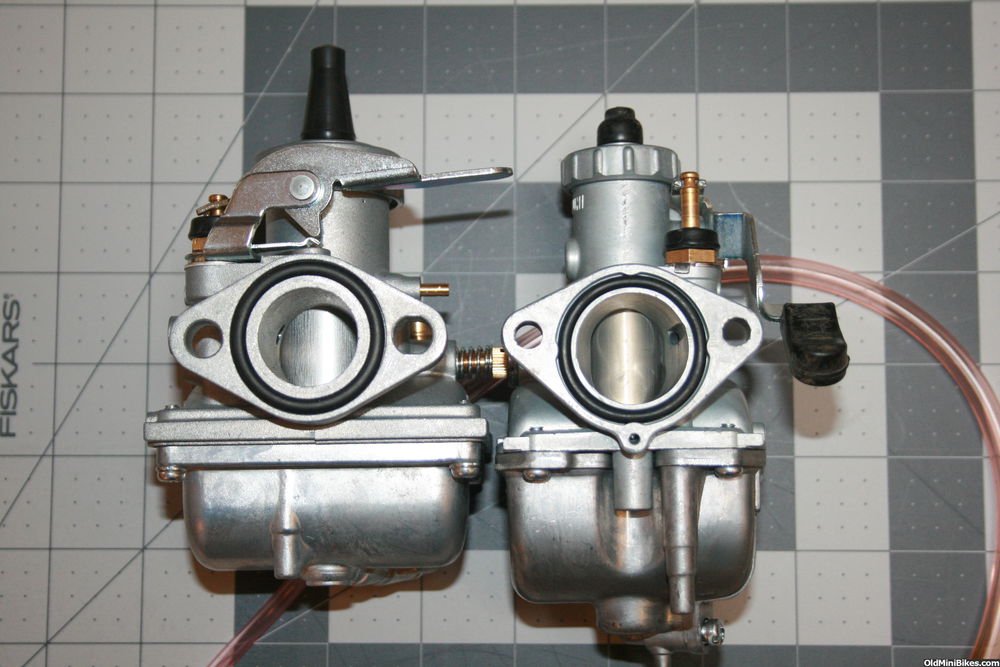I have heard so many times "I just got a genuine Mikuni carb and it was only $29.00 on Amazon!" and in true journalistic fashion, I am trying to debunk this common urban myth!
Genuine Mikuni carbs typically sell for $70-$110 dollars for a VM22 flange type carb. The typical confused consumer will Google shop and see it on Amazon at $29.00 and think that Amazon's buying power allows them this awesome deal...and that's when they actually receive the "Chikuni" carb which was offered by the very reputable Amazon website as the real thing. Amazon does not care about police-ing their sellers. They are a money driven machine that moves products from someone that sits in their garage after their trip Guanxing Dingdong province of China and has a brother that makes carbs...labeled as Mikuni! Apparently Mikuni has done nothing to prevent the importation of these items, and like I mentioned, Amazon does not care, they want their percentage!
This is not a "mine's better than yours" thread...both are nice carbs! The Chikuni's have proven themselves as solid performers. Just be informed that the parts from these two carbs do not interchange!
PLEASE NOTE! MIKUNI IS ON THE LEFT, CHIKUNI ON THE RIGHT!
Please notice in this pic that I have aligned the mounting flange up on the grid line the same for both carbs

You will notice that the Chikuni sits a bit lower and is a much smaller carb than the Mikuni.
Now, let's take a look at the flange side. When someone buys a manifold for a Mikuni and then complains that it does not fit, here is why

Notice how the Mikuni bolt holes are in line with the inlet? Notice how the Chikuni inlet not in line, but the centerline is much lower. Even if you get past the different bolt spacing and are able to mount this, you most likely will have a very large vacuum leak. If you bought a manifold for a 22 Mikuni, chances are you ordered the right part, just the wrong carb!
The slides in these carbs are also very different. The Mikuni is nearly 50% larger than its counterpart!

If your "Genuine Chikuni Mikuni" has a casting mark of a hex head bolt on its side, it is probably not a real Mikuni...and it's not "made in Japan" it has "Japan T/A"...which either means "technical assurance" or something with a brass pole!

So, here ya go! That is my .02
I am not hatin' on the Chikuni...I have used several and they work well. It is just not a real Mikuni and I don't pretend that I know the difference, I do know!
Genuine Mikuni carbs typically sell for $70-$110 dollars for a VM22 flange type carb. The typical confused consumer will Google shop and see it on Amazon at $29.00 and think that Amazon's buying power allows them this awesome deal...and that's when they actually receive the "Chikuni" carb which was offered by the very reputable Amazon website as the real thing. Amazon does not care about police-ing their sellers. They are a money driven machine that moves products from someone that sits in their garage after their trip Guanxing Dingdong province of China and has a brother that makes carbs...labeled as Mikuni! Apparently Mikuni has done nothing to prevent the importation of these items, and like I mentioned, Amazon does not care, they want their percentage!
This is not a "mine's better than yours" thread...both are nice carbs! The Chikuni's have proven themselves as solid performers. Just be informed that the parts from these two carbs do not interchange!
PLEASE NOTE! MIKUNI IS ON THE LEFT, CHIKUNI ON THE RIGHT!
Please notice in this pic that I have aligned the mounting flange up on the grid line the same for both carbs
You will notice that the Chikuni sits a bit lower and is a much smaller carb than the Mikuni.
Now, let's take a look at the flange side. When someone buys a manifold for a Mikuni and then complains that it does not fit, here is why
Notice how the Mikuni bolt holes are in line with the inlet? Notice how the Chikuni inlet not in line, but the centerline is much lower. Even if you get past the different bolt spacing and are able to mount this, you most likely will have a very large vacuum leak. If you bought a manifold for a 22 Mikuni, chances are you ordered the right part, just the wrong carb!
The slides in these carbs are also very different. The Mikuni is nearly 50% larger than its counterpart!
If your "Genuine Chikuni Mikuni" has a casting mark of a hex head bolt on its side, it is probably not a real Mikuni...and it's not "made in Japan" it has "Japan T/A"...which either means "technical assurance" or something with a brass pole!
So, here ya go! That is my .02
I am not hatin' on the Chikuni...I have used several and they work well. It is just not a real Mikuni and I don't pretend that I know the difference, I do know!
Last edited:

